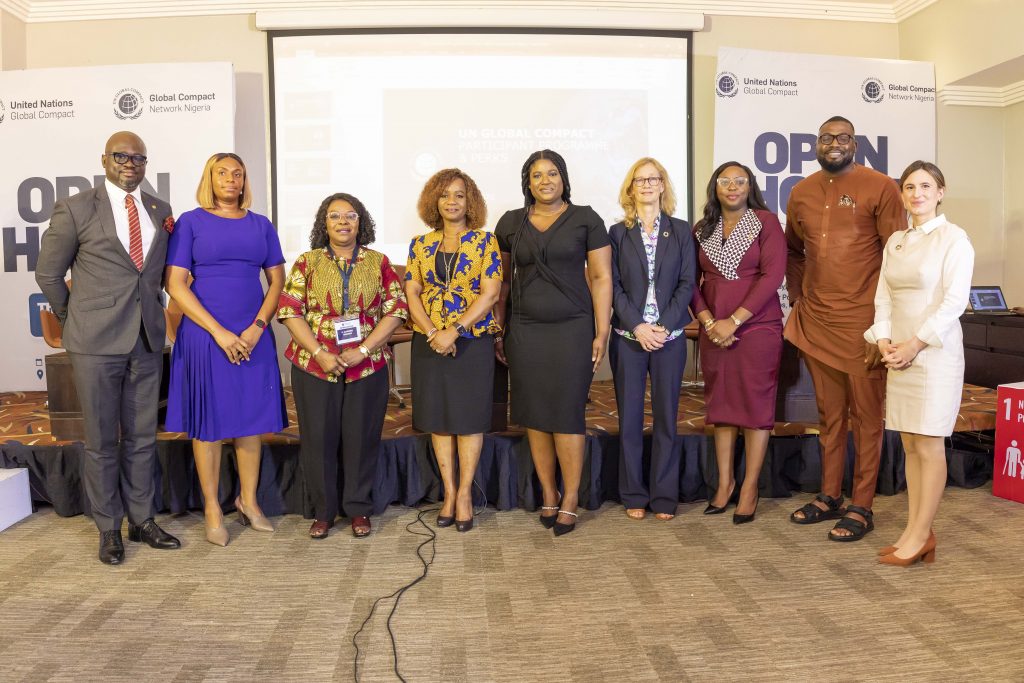2022-06-17
Lagos State, Nigeria
LAGOS, NIGERIA, 17 June 2022 — More than 80 company executives and senior government officials, committed to the SDGs, attended the Open House to discuss the business case for sustainability. The event, which was organised by the United Nations Global Compact Network Nigeria, in collaboration with the United Nations Global Compact office, New York, was held earlier today, 17 June 2022, at the Four Points by Sheraton Lagos.
The participants of the event were drawn from many local corporate organisations and multi-national conglomerates, including; Sterling Bank, Fidelity Bank, FBN Holdings, Heineken Nigeria, Lafarge, Nigeria LNG Limited (NLNG), Stanbic IBTC, AG. Leventis Nigeria, Shell Petroleum Development Company of Nigeria Limited (SPDC), Greenwich Merchant Bank, Oando Plc, Nigerian Exchange Group, Transport Services Ltd, Chams PLC, Highwaters LP, Seplat Energy, Flour Mills of Nigeria Plc, and KPMG Nigeria, among others.
The objective of the engagement was to identify the key roles the private sector plays in achieving the SDGs in a Nigerian context and how the UN Global Compact supports businesses in accelerating their sustainability journey.
While delivering the open remarks on behalf of Mrs. Soromidayo George, Board Chair, UN Global Compact Network Nigeria, Mrs. Uto Ukpanah, Board Member, UN Global Compact Network Nigeria, explained that the theme of the event resonates with how we can promote greater cross-functional collaboration in addressing some of the world’s greatest sustainability challenges.
Speaking on the mandate of the Local Network, she said, “Our Local Network works tirelessly to stimulate the creation of local connections and catalyses companies and stakeholders to achieve Agenda 2030 in Nigeria.
“We strive to mobilise a local movement of sustainable companies and stakeholders with the aim of improving the lives of future generations.
“We support companies and stakeholders in understanding what responsible business means within a global and local context. We also provide guidance to translate sustainability commitments into action.
“We understand that the purposeful unity of businesses for a stable and progressive world order is more inevitable and compelling now than ever before,” she concluded.
During her presentation on “the case for sustainability”, Sue Allchurch, Chief Outreach & Engagement, UN Global Compact, averred that participants of the UN Global Compact perform much better than their counterparts.
Ms. Allchurch revealed that companies that embed sustainability in their strategy also see strong operational efficiency and risk management and improved stakeholder engagement with investors, NGOs, civil society partners and governments.
According to her, “These companies experience improved sales and marketing practices, supplier relations where you really understand the commitment to people throughout the supply chain.“
The fireside chat, titled, “The Business Case for Sustainability,” was made up of Chinwe Okpala, Group Head, Corporate Affairs, Communications and Sustainability, UAC of Nigeria Plc; James Adenuga, Group Chief HSSE & Sustainability, Dangote Group; Olubunmi Fabanwo, Chairman, Lagos State Civil Service Commission; Adebisi Adeoti, Country Leader, DOW Chemicals; and Titilayo Giwa, Company Secretary/Head of Legal, Ripen Marine Contractors Ltd.; and was moderated by Sue Allchurch.
Mrs. Fabamwo affirmed that Lagos is one of the most progressive states in Nigeria. “We have entrenched gender equality in our administration,” she stated.
Ms. Okpala noted, “In the business of sustainability, you don’t have competitors, only collaborators. Sustainability should be a collective responsibility.”
In his submission, the Country Manager, Dow Chemicals, Adebisi Adeoti, shared that their organization has partnered with local universities in Nigeria to produce sustainable and environmentally friendly products. He disclosed that in a bid to foster inclusivity, the company offers maternity and paternity leave to employees.
Mr. Adenuga informed the participants that their company had made remarkable changes towards their sustainability endeavours, which had yielded a meaningful impact on the company’s operations.
Ms. Giwa expressed that although there is much work to be done in inclusiveness working in a male-dominated industry, her organization has adopted a more responsible approach and sustainable practices that go beyond the use of buzzwords and shows of charity.
Following the panel discussions was the onboarding session for over 35 member companies as participants in the United Nations Global Compact by Meghan Black, Senior Manager, Participant Engagement, United Nations Global Compact.
While commenting on the success of the event, Naomi Nwokolo, Executive Director, UN Global Compact Network Nigeria and Chair, African Regional Network Council – United Nations Global Compact, called on more corporate entities to become participants of the Global Compact. She urged the attendees to commit to implementing the Ten Principles, which are divided into four categories: human rights, labour, the environment, and anti-corruption.
According to Ms. Nwokolo, “in order to achieve sustainability, corporate companies must adjust their business mentality from aiming to be the best in the world to striving to be the best for the world.”
Tumi Onamade, Senior Manager, Participant Engagement & Programmes, UN Global Compact Network Nigeria, congratulated the newly onboarded participants and maintained that being a member of the Global Compact guarantees better profitability, higher corporate valuation, and a lower cost of capital.
“Our programmes offer guidance to create value for both shareholders and society in the short and long term,” she added.
Also in attendance was Mr. Laoye Jaiyeola, Vice-Chair, UN Global Compact Network Nigeria and CEO, Nigeria Economic Summit Group.

